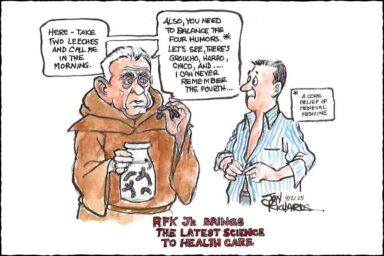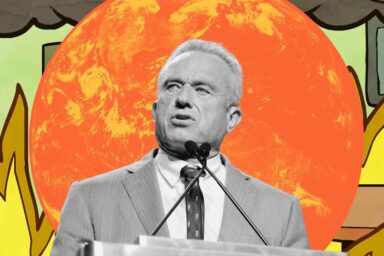COVID-19: Hard-Right Politics Drove Lies, Denial, and Deaths
Both the UK and the US governments subscribed to their own exceptionalism: Virus outbreaks happened elsewhere, not here.
|
Listen To This Story
|
Two great nations, ranked number one and two in the world for pandemic preparedness, failed miserably when COVID-19 reared its ugly head in 2020. The United Kingdom, the second-ranked nation, is currently holding a COVID-19 inquiry, attempting to get to the reasons for the flaws in the UK’s initial response to the pandemic.
A commentator writing last month in The Lancet describes the testimony of recent witnesses as going beyond making the UK “the laughing stock of the world” to exposing criminal incompetence. The writer concludes that many — if not most — of the 230,000 deaths in the UK were preventable.
Tragic, but why should it strike home for readers here in the US? Well, because the US was the other nation, top-ranked in the world, and because, back in June 2020, Time magazine described the UK’s and US’s COVID-19 responses as eerily similar.
Two Illiberal Populists
This mirroring reflects the fact that the politically driven, pro-economy, herd-immunity strategy implemented by both countries was codified in the Great Barrington Declaration (GBD), a cross-Atlantic misadventure called “unethical” by the head of the World Health Organization. As Time put it, referring to British Prime Minister Boris Johnson and US President Donald Trump:
Two right-wing “illiberal populist” leaders who believed their nations were invulnerable, generally rejected science, and turned inwards and away from multilateralism. Their parallel decisions consigned many of their citizens to the grave.
On January 30, 2020, the WHO declared a public health emergency. Two weeks later, on February 4, Johnson was briefed on the issue and expressed concern about “overreacting.” He followed this with a mysterious disappearance from public life, taking a 10-day mid-February holiday in a large country house in Kent.
If this brings to mind Mike Johnson adjourning the House and jetting off to Paris seven days before the pending government shutdown, or Ted Cruz abandoning Texas and heading to Cancun as people literally froze in their homes, the common theme may be that right-wing leaders’ insistence on personal responsibility stops short at their own doors.
When Boris Johnson returned from his holiday and Italy was suffering from the frightening outbreak of clusters of deadly infections, the Downing Street response was still a failure to engage, “laughing at the Italians,” and an expectation that the UK would show them up on the world stage with its own easy navigation of the crisis.
Johnson chaired his first high-level meeting regarding the COVID-19 crisis on March 2, 2020. Even when Italy locked down on March 9, there was still no firm planned UK response, as debate continued to rage over suppression versus mitigation.
It wasn’t until the evening of March 13 that, according to the piece in The Lancet, “Downing Street realized that the NHS would be overwhelmed if it continued to pursue a policy of mitigation (herd immunity).” Johnson’s advisers warned him that treating the virus like influenza was an enormous mistake and the nation was headed for disaster. Nevertheless, in a meeting on March 19 between Johnson and Rishi Sunak, his chancellor at the time, Johnson said, “We’re killing the patient to tackle the tumor. … Why are we destroying the economy for people who will die soon anyway?”
This callous disregard for the elderly parallels the loss of interest by the Trump administration in combating the COVID-19 crisis when it discovered the virus was hitting blue states much harder than red states in its initial phase.
Except that, in the case of Trump, the policy was driven by considerations darker still than mere neglect: Letting COVID-19 rage was sold to Trump by his son-in-law and top adviser Jared Kushner as a form of political and economic retribution against Trump’s blue-state enemies. Ironic, of course, in light of the ultimately far greater damage done by COVID-19 to red states, stubbornly more resistant to public health mandates as they were.
Weakening Their Defenses
It is worth remembering that, long before the WHO announced the COVID-19 health crisis, both administrations had taken steps that rendered their countries more vulnerable to a pandemic. Trump, back in May 2018, disbanded the pandemic task force created by his predecessor, Barack Obama. And as a part of his agenda to slash regulations and minimize government, he called for huge cuts to the Centers for Disease Control and Prevention as a whole, and “succeeded in gutting the CDC’s public health Science and Surveillance program,” which had the responsibility for outbreak preparedness.
Meanwhile the British government, under the stewardship of the Conservatives, had weakened their health care system through austerity policies. Then in 2016, when they ran a simulation exercise showing there would be a huge shortage of ventilators and personal protective equipment (PPE) for health care workers in the event of the pandemic, they promptly decided to put preparation on hold for two years while they devoted resources to Brexit instead.
Enough ink has been spilled about how disastrous Brexit has proved to be for the UK in general, but it is worth highlighting that if even a fraction of the massive resources spent in furtherance of that Titanic of a public policy had been used to bolster public health and pandemic preparedness, it would have saved thousands of British lives.
Both the UK and the US governments subscribed to their own exceptionalism: Virus outbreaks happened elsewhere, not here. But rather than seeing that as the result of preparation and allocation of resources, they saw it as something inherent that didn’t require effort. They thus ignored the WHO’s instructions to the world about how to prevent COVID-19 transmission. Foolish pride, as ever, goeth before a fall.
The Johnson government’s dismissal of the seriousness of the crisis extended not just to national policy but to its own day-to-day conduct. The deputy head of civil service showed this in her testimony at the current inquiry: Helen MacNamara said she “struggled to think of a single day when Downing Street adhered to the emergency rules it had set, which many citizens were prosecuted for failing to follow.”
Burying the Post-Mortem
The results of the COVID-19 inquiry in the UK so far have shown it was a “historic catastrophe” based on “disastrous groupthink.” This is the damning assessment from Dominic Cummings, Boris Johnson’s top adviser at the time. Another way to put it would be lies on top of denial interspersed with incompetence.
The closest parallel in the United States to the ongoing COVID-19 inquiry in the UK was the Democrat-led House Select Subcommittee on the Coronavirus Crisis. One HSSCC report included the finding that the Trump administration seized control of communications regarding the crisis away from the CDC. The report also detailed the secretive work of doctors aligned with the GBD behind the back of Trump’s White House coronavirus response coordinator, driving the administration’s embrace of the “discredited and disastrous” herd immunity strategy.
Unfortunately, following this year’s takeover of the House by the GOP, their response to the HSSCC opened with testimony by the very signers of the GBD who worked in the Trump White House as a force behind its continuation of pandemic polarization. While the UK has at least begun to face up to the disaster wrought upon its public by its far-right government, in the US the GOP-controlled House lost no time in burying the post-mortem.
Perspectives on Psychological Service published a study in October discussing how the catastrophic COVID-19 death total was largely preventable but for the political polarization that permeated the US’s crisis response. Statistics have shown that red states overall fared much worse than blue states, underlining that political decisions matter in times of crisis.
Trump is facing a number of indictments for various crimes against the country during and after his term of office but, in order to fully appreciate his failures as a leader, we must also reassess his deadly pandemic policies. Both the US and the UK elected nationalist, isolationist governments that believed they could ignore the world, closing their borders to its plagues, refugees, climate, and strife. They, and we, found out otherwise.
Doug Ecks is a lawyer and writer. He holds a JD from the University of California, Hastings and a BA in philosophy from California State University, Long Beach, Phi Beta Kappa. He also writes and performs comedy as Doug X.




